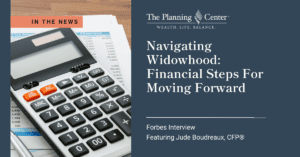By Cicily Maton, Retired Sr. Financial Planner
Cicily Maton has retired, however, Michelle Maton CFP®, EA, CeFT® Sr. Financial Planner and Andy Baxley CFP®, CIMA®, CeFT® Sr. Financial Planner carry on her legacy in the Chicago office.
About twenty-five years ago Michelle, TPC Partner and my daughter, were on our way to a financial planning conference. It was there that we met one of the pioneers of the industry, Dick Wagner. It was the first time we heard Dick tell everyone that there were only three things one needed to do to be financially successful; 1. Spend less, 2. Save more; 3. Don’t do anything stupid. As it turns out, this third step is not as easy as it sounds.
In the intervening years there has been a wealth of research to help us understand why we humans have so much difficultly achieving financial wealth and happiness. Research spans the fields of neurology, psychology, and economics. Studies of the brain reveal that some of our decision making is closer to the caveman than modern man. We now know what parts of the brain are “firing” when making different kinds of decisions.
A new field has emerged in economics, Behavioral Finance, upsetting the idea that we are rational decision makers. There are now two recipients of the Nobel Prize in Economic Sciences, Daniel Kahneman and Richard Thaler, both for their work in how we make decisions. They have written books that are helping us all to understand the process that helps and inhibits us as we endeavor to meet the challenge of Dick Wagner’s guide to financial wellbeing; save more, spend less, and don’t do anything stupid.
Much research focuses on our use of heuristics. A heuristic is a short cut or a rule of thumb that helps us make short term decisions or solve problems without much thinking or discovery. It is not optimal, perfect, or rational. It often leads us to make incorrect decisions. The reality is that we all have cognitive biases that influence how we perceive information based on our own experiences and preferences. This allows the brain to prioritize and process the vast amount of input it receives each second. While the mechanism is very effective, its limitations can cause errors.
It may not be totally possible to eliminate the brain’s predisposition to take shortcuts, but just understanding that bias exists can be useful when making decisions. There is a continually evolving list of cognitive biases that have been identified over the last six decades of research on human judgment and decision-making in cognitive science, social psychology and behavioral economics.
There are hundreds of identified biases and most frequent biases are:
- Anchoring – focus on one piece of information
- Confirmation – seeking information to confirm our own judgement
- Hindsight – knowing after the event that it was predictable
- Impact – overestimating the importance of an event because of its potential impact
- Overconfidence – being too confident about our abilities
- Status quo – not being able to see past the current situation
You can mitigate the influence of your biases by just being aware that we all have them. Try playing devil’s advocate, check your key assumptions, run the numbers in a what-if scenario, or step into another time horizon by asking yourself if it were five years later and I looked back what would I see.
At the Planning Center we use a number of strategies to help clients avoid decision making errors:
- Slow Down. Daniel Kahneman’s book, Thinking, Fast and Slow, reminds us that not all decisions need to be made NOW, and some decisions should be made after deliberate and thoughtful consideration. The Transitionist Institute has two very helpful tools; Decision Free Zone in which you divide all issues into Now, Soon and Later. My favorite tool is the Financial Triage. It is best completed with a trusted friend or advisor to identify the level of threat and your ability to control any fear or concern that is bothering you or keeping you from a good night’s sleep.
- Recall Past Transitions. Make a list of strategies you have used in the past when faced with tough decisions. List friends or professionals who were helpful. Try to remember emotions that you felt during that time – both good and bad. Make an effort to avoid the bad.
- Define What is Really Important. Too often we are fooled into thinking something is very important, but it is just our biases at work. Make a short list of what is really important. Write down your core values. Then review your list of what is really important again. Do they match?
If life seems more complex, demanding, and confusing to you, your brain will be hard at work making sense of it all. Our brains will be using all of the short cuts, including hundreds of cognitive biases. Do not despair, Dick Wagner was right; 1. Spend less, 2. Save more; 3. Don’t do anything stupid. You take care of number 1 and 2. The Planning Center will be here to help you with number 3. Contact us to begin.






